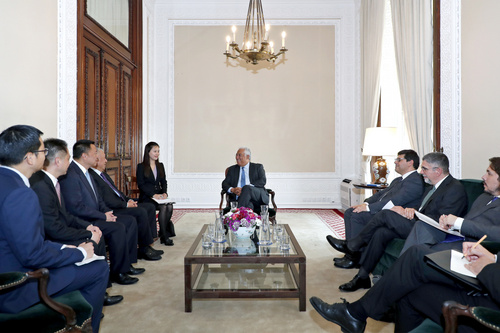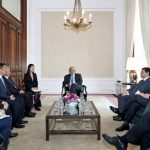 Vice Chairman of the CPPCC National Committee and former Chief Executive of Macao SAR Mr Ho Hau Wah, Secretary for Economy and Finance, Mr Leong Vai Tac, meet with the Prime Minister of the Portuguese Republic, Mr António Costa, in Lisbon.
Vice Chairman of the CPPCC National Committee and former Chief Executive of Macao SAR Mr Ho Hau Wah, Secretary for Economy and Finance, Mr Leong Vai Tac, meet with the Prime Minister of the Portuguese Republic, Mr António Costa, in Lisbon.
The Vice Chairman of the National Committee of the Chinese People’s Political Consultative Committee (CPPCC) and former Chief Executive of the Macao Special Administrative Region (SAR), Mr Edmund Ho Hau Wah, and the Secretary for Economy and Finance, Mr Leong Vai Tac, paid a courtesy visit to the Prime Minister of the Portuguese Republic, Mr António Costa, in the afternoon of 21 June.
Mr Ho thanked Mr Costa for the reception, and for the Portuguese Government's support for Macao’s role as a commercial and trade cooperation service platform between China and Portuguese-speaking countries. He hoped Mr Costa’s administration would continue supporting Macao in its platform role, enabling it to make best use of its advantages in fresh and vigorous ways.
Mr Ho said that the Office of the Secretary for Economy and Finance, the Monetary Authority of Macao and other relevant departments of the Macao SAR Government would contact appropriate Portuguese Government departments to discuss fostering cooperation in this area.
In welcoming the delegation led by Mr Ho, Prime Minister Costa said the Portuguese Government would provide Macao with full support – via the Ministry of Finance and the Central Bank of Portugal – regarding talent cultivation and technology development for Macao.
The meeting was followed by a ceremony to sign the “Protocol on the Avoidance of Double Taxation and Prevention of Fiscal Evasion with Respect to Taxes on Income” between the Governments of the Macao SAR and the Portuguese Republic. Secretary Leong and Portugal’s Secretary of State of Tax Affairs, Mr António Mendonça Mendes, signed the agreement on behalf of their respective administrations.
The main aim of the Protocol is to enhance transparency, and improve avoidance of double taxation standards; but also to maintain confidentiality when exchanging information between the two governments, thus protecting taxpayers' privacy, it was noted.
The signing of the Protocol satisfied the requirements – regarding peer review – called for under the Organisation for Economic Co-operation and Development (OECD) Global Forum on Transparency and Exchange of Information for Tax Purposes. As such, the Protocol would be conducive to creating a fair tax environment to fulfil Macao’s commitment to international tax transparency and tax cooperation. At the signing ceremony, Mr Leong said that Macao would continue strengthening cooperation with other countries and regions in establishing a fair tax environment that met international standards.
Mr Leong added that as well as cooperating on taxation matters, Macao was happy to play the role of a commercial and trade cooperation service platform between China and Portuguese-speaking countries, in order to deepen the bilateral relationship between the Macao SAR and Portugal, and to establish closer links in commerce, trade, tourism, education and other areas. The signing of the Protocol marked a consolidation of cooperation between the two sides, and set the stage for further mutually-beneficial cooperation and win-win opportunities.
Mr Ho and Mr Leong also attended a cocktail reception celebrating the 15th anniversary of the establishment of the Forum for Economic and Trade Co-operation between China and Portuguese-speaking Countries, an organisation also known as Forum Macao. Speaking at the reception, Mr Ho expressed his hope that all involved would combine their efforts, to promote multilevel, comprehensive – and a deeper and broader – development of the Forum, creating a new model of cooperation under the framework of the “Belt and Road” initiative.
The Macao SAR Government was committed to establishing a commercial and trade cooperation service platform between China and Portuguese-speaking countries, and had achieved remarkable results, noted Mr Ho. Chinese entrepreneurs could make full use of Macao as a platform to cooperate with Portuguese-speaking countries, and further expand their businesses to embrace the European Union, Latin American and African markets. Portuguese-speaking countries could also make use of Macao as a unique platform to seek cooperation and business opportunities in the huge China market, he added.
Mr Leong said at the reception that during the 15 years since the establishment of Forum Macao, the Macao SAR Government had been supportive of the goals set out in the Action Plans of the five Ministerial Conferences of Forum Macao held so far; as well as supportive of making the most of Macao’s advantages in language, culture and information services, in order that the city could play a bridging role between China and Portuguese-speaking countries.


